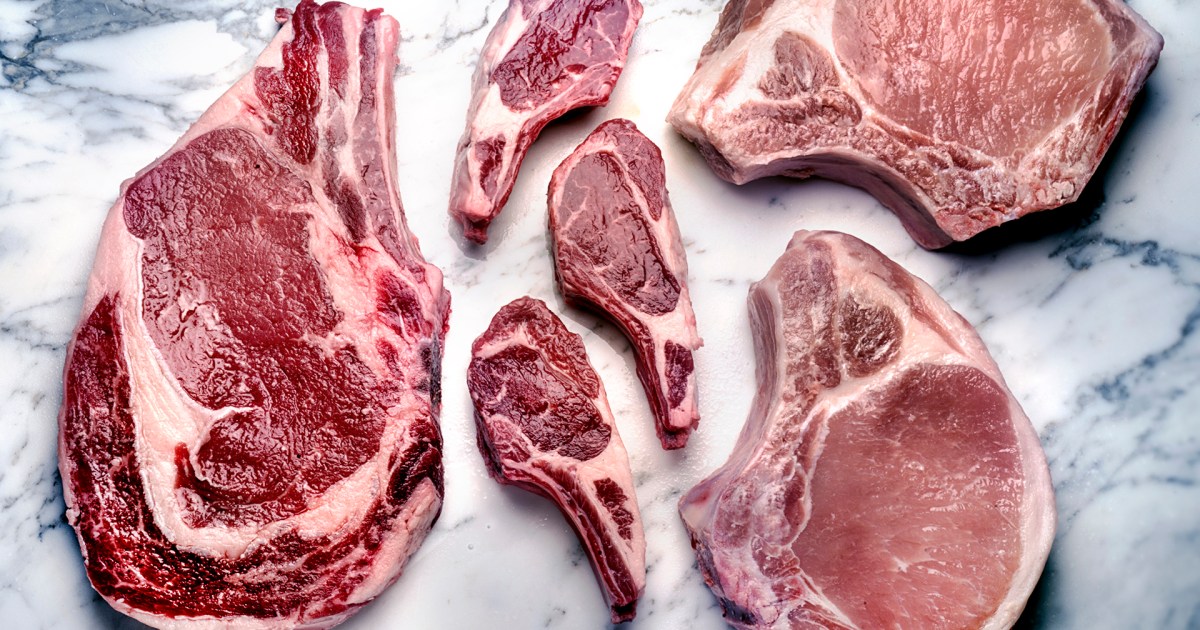Beef and lamb are two main ingredients in many dishes and recipes in our Arab world, and they are eaten grilled, boiled and fried, with rice, bread, stews, etc., so what happens to the body of a fasting person when eating beef and lamb?
We chose to present beef and lamb in one report in order to compare them and explain the features of each type.
To begin with, we get to know the nutritional components, which 100 grams of beef provide us with, which are approximately:
Calories: 217 calories.
Protein: 26 grams.
Fat: 12 grams.
Cholesterol: 78 milligrams
Then we move on to the nutritional components that 100 grams of lamb provide us, which are approximately:
Calories: 258.
Protein: 25 grams.
Fat: 17 grams.
Cholesterol: 106 milligrams.
Beef and veal
Veal comes from young livestock, usually 6 to 7 months old.
And "beef" usually comes from the age of one year and over.
While veal and beef are both red meat, beef is darker in color.
Veal has a smoother texture, is easier to digest when compared to beef, and the cholesterol in veal is higher.
Lamb and mutton
Mutton is the meat of cattle that are less than 12 months old.
“Lamb” is a type of cattle that is a year old and over.
What happens to the body of the fasting person when eating beef and lamb?
When a fasting person eats beef or lamb, he gets high-quality animal protein, iron, zinc, and vitamins.
Eating a moderate amount of these meats is important in a healthy diet.
And by high-quality animal protein, we mean that it contains all 9 essential amino acids needed for the growth of the body.
As the building blocks of proteins, amino acids are very important from a health perspective.
And meat is one of the most complete food sources of protein, as its amino acid properties are almost identical to your muscles.
A fasting person eating beef and lamb gives him the following:
amino acids.
Iron and zinc.
Calories.
Helps feel full.
The things that a fasting person should pay attention to when eating these meats are the following:
Cooking method, it is advised to boil the meat, then get rid of the boiling water, in order to reduce the proportion of fat in it.
Unhealthy grilling, which leads to burning of meat, leads to the formation of harmful substances on the meat, the meat must be grilled in a healthy way, by keeping it away from the flame, and the meat can be boiled a little before grilling so that it does not take a long time on the grill.
You should reduce or not add salt to meat, as it leads to thirst.
If a person is suffering from high fat or cholesterol, they should save on veal and lamb, and the amount of fat in beef and lamb depends on the level of pruning, the age, breed, sex and food of the animal;
But lamb has higher cholesterol and fats than beef.
You should avoid or reduce processed meats, such as sausages, mortadella and smoked meats, as they are rich in sodium, and there are data indicating the possibility of their association with some types of cancer.
What are the health benefits of beef and lamb?
Beef and lamb protein are highly nutritious, and may promote muscle preservation.
Supplying the body with vitamin "B12" (B12), which is an essential nutrient that is important for the formation of the blood, brain and nervous system.
Supplying the body with minerals such as zinc and selenium.
Providing the body with iron, which is absorbed very efficiently, and protects against anemia.
Supplying the body with niacin, vitamin B3 (B3) and vitamin B6 (B6), which have important functions in the body.
Providing the body with "Creatine", which acts as an energy source for the muscles.
Excessive cooking
Heterocyclic amines are a family of carcinogens that are formed during high temperature cooking for animal protein, especially when frying, baking, or grilling.
It is found in "overcooked" meats, poultry and fish.
These substances may partially explain the link between red meat and cancer.
A large number of studies indicate that eating overcooked meat - or other dietary sources of heterocyclic amines - may increase the risk of various types of cancer.
In order to maintain health, it is recommended to limit the consumption of overcooked meat.
Conversely, steaming, boiling, and cooking are healthy cooking methods.
Unprocessed and moderately cooked beef and lamb, when eaten in moderation, is considered healthy, especially in the context of a healthy lifestyle and a balanced diet.
As for lamb, and to reduce its fat and cholesterol content, it is recommended to choose lean cuts.

